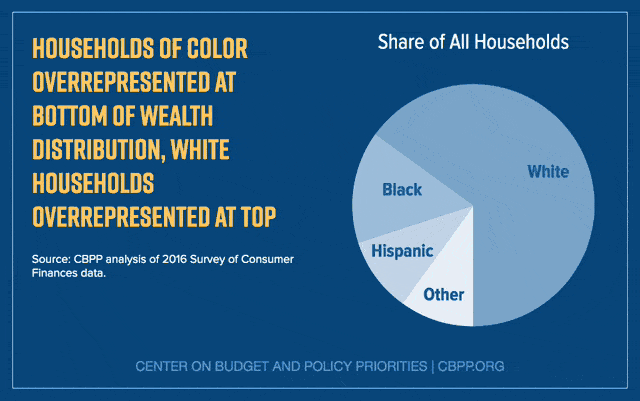Racial barriers to economic opportunity have played a substantial role in determining today’s income and wealth distribution, in which households of color are overrepresented at the bottom while non-Hispanic white households are heavily overrepresented at the top. According to a new report by the Center on Budget and Policy Priorities (CBPP), the tax code can affect different races and ethnicities in widely disparate ways, and tax policy changes can either widen or narrow racial disparities.
Overtly racist policies like slavery and confiscation of Native American lands laid the foundation for the deep economic disparities that exist today. The legacy of these policies — combined with racial discrimination today in areas such as housing, employment, and law enforcement — makes it harder for people of color to make economic gains and build wealth.

The cumulative harm of policies that reinforce the legacy of white supremacy is evident in the accumulation of wealth. White households — representing 65 percent of all households in the United States — own 87 percent of the nation’s wealth, and the wealthiest 10 percent of white households own nearly two-thirds of the nation’s wealth. This did not happen by accident, but as a result of centuries of public policy decisions.
Fortunately, there are ways to reform the federal tax code that advance racial equity and reduce income and wealth disparities. This starts with raising significantly more revenue from those who earn the most income and have the most wealth. New revenue could then fund investments that improve economic opportunities for those who earn and own the least.. Regressive, unproductive tax breaks can also be overhauled, while those that are already efficient and inclusive, like the Earned Income Tax Credit (EITC) can be bolstered.
State and local tax policies are also a powerful tool for widening or narrowing racial disparities. Even state and local tax policies that appear “race neutral” are anything but, as they actually further exacerbate racial disparities. When state and local policymakers design tax policy and decide how to distribute public resources, they effectively choose whether to push back against this history and attempt to rectify existing barriers, or continue with the status quo.
History shows that many of the key tax policy decisions of the past, including supermajority requirements for raising revenue, property tax limits, and adoption of sales taxes often reinforced already profound barriers faced by people of color. In addition, tax administration practices — such as property tax assessments and valuations — were also frequently done in ways that worsened racial inequities.
The good news is that state and local policymakers can implement solutions now that would make a difference, reducing barriers for people of color and improving equity. Fiscal policies that tax the most well-off households to a greater degree, raise revenue for investments that boost opportunity for communities of color, and remove artificial revenue-raising constraints are effective strategies for moving in the right direction.
In New Jersey, there is a path forward to enhance racial equity through the tax code by adding new brackets for top earners and taxing inherited wealth in a more progressive manner. These reforms could fund targeted public investments like K-12 education, higher education, and job training programs, all of which are essential to reducing deeply-rooted racial barriers.

